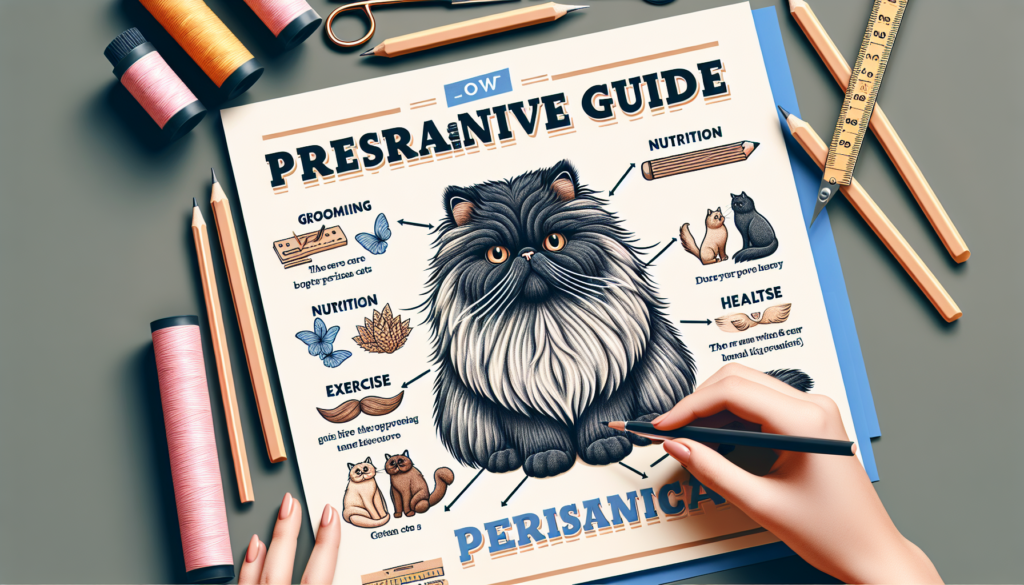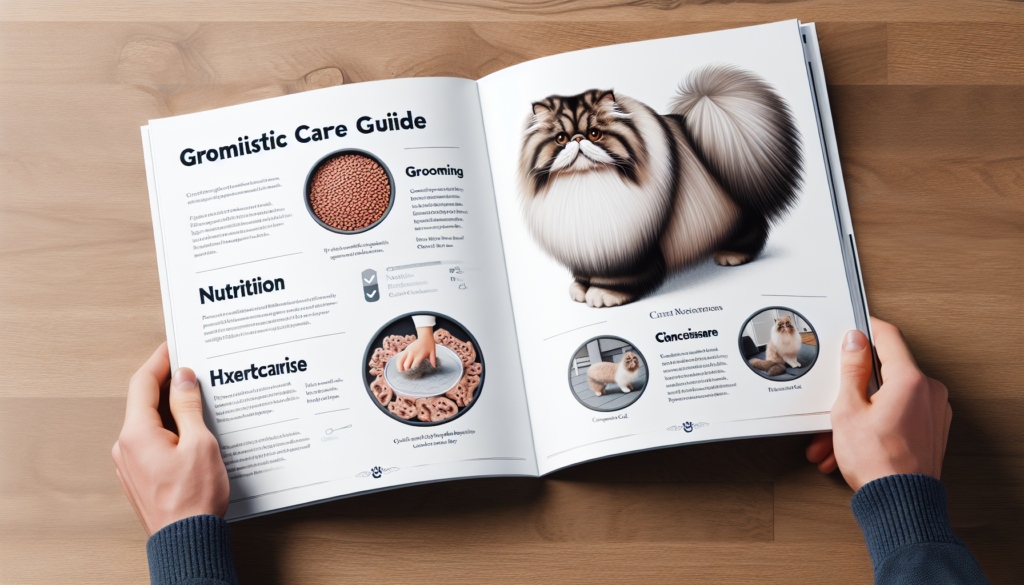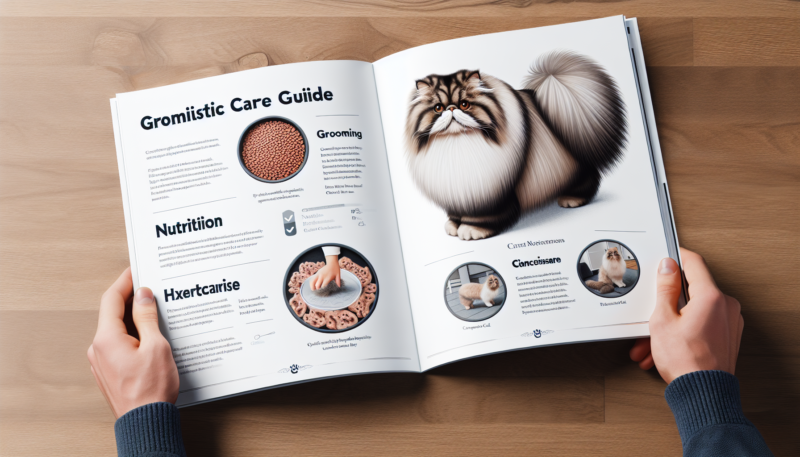So, you’ve recently welcomed a beautiful Persian cat into your life and want to ensure that you provide them with the best care possible. Caring for Persian cats requires some specific attention and understanding due to their unique characteristics. From grooming routines to dietary considerations, this article will guide you through the essential aspects of caring for Persian cats and help you create a healthy and happy environment for your feline friend.
Grooming
Brushing their long fur
When it comes to grooming your Persian cat, one of the most important tasks is brushing their long, luxurious fur. Persian cats have a thick double coat that requires regular brushing to prevent matting and tangling. Use a wire brush or a comb with wide teeth to gently remove any knots or tangles. Regular brushing also helps to distribute their natural oils, keeping their coat soft and shiny. Make sure to be gentle and patient during the process, as Persian cats can be sensitive to grooming.
Bathing
While Persian cats are known for their beautiful coat, it’s essential to keep it clean and free from dirt or debris. Regular baths are necessary to maintain their hygiene. Use a cat-friendly shampoo and warm water, ensuring that you thoroughly rinse off any shampoo residue. Take care not to get water or soap in their eyes or ears. It’s recommended to use a gentle baby wipe to clean their face instead.
Eye and ear cleaning
Persian cats are prone to eye and ear issues due to their unique facial structure. Regular cleaning can help prevent infections and keep them comfortable. Use a soft cloth or cotton pad moistened with warm water to gently wipe around their eyes, removing any discharge or tear stains. Remember to always use a separate cloth or pad for each eye to avoid the risk of spreading any potential infections. For their ears, use a vet-recommended ear cleaning solution and a cotton pad to carefully clean the outer ear. Never insert anything into their ear canal.
Nail trimming
Keeping your Persian cat’s nails trimmed is important for their comfort and your furniture’s sake. Invest in a pair of cat nail clippers or a nail grinder specially designed for cats. Take care not to cut into the quick, which is the sensitive part of the nail that contains blood vessels. If you’re unsure, consult your veterinarian or a professional groomer for guidance. Regular nail trims, every few weeks, will help prevent painful overgrowth and potential scratching accidents.
Maintaining dental hygiene
Just like humans, cats can suffer from dental problems such as tartar buildup, gum disease, and tooth decay. Regular dental care is crucial for your Persian cat’s overall health. Brushing their teeth may be a challenge at first, but with patience and persistence, it can become a part of their routine. Use a cat-specific toothbrush and toothpaste, never use human toothpaste as it can be toxic to cats. Start by gently introducing the toothbrush and gradually increase the brushing time. Additionally, providing dental treats or toys designed to promote oral hygiene can also help in maintaining their dental health.
Feeding
Choosing the right cat food
Proper nutrition is vital for your Persian cat’s health and well-being. Selecting a high-quality cat food that is specifically formulated for Persians is essential. Look for a brand that lists real meat as the main ingredient and avoids fillers or artificial additives. Persian cats have unique dietary requirements, including higher protein levels and lower levels of carbohydrates. Consult your veterinarian to determine the best diet for your Persian cat based on their specific needs.
Feeding schedule
Establishing a regular feeding schedule is important for maintaining your Persian cat’s weight and preventing overeating. Divide their daily food allotment into several small meals throughout the day. This helps regulate their metabolism and prevents them from becoming overweight, which can lead to various health issues. Stick to a consistent schedule and avoid leaving food out all day, as free-feeding can contribute to obesity.
Portion control
Proper portion control ensures that your Persian cat is getting the right amount of food without overeating. Follow the feeding guidelines on the cat food packaging and adjust accordingly based on your cat’s individual needs, including age, weight, and activity level. Monitor your cat’s body condition and consult your veterinarian if you notice any weight gain or loss.
Ensuring clean and fresh water
Access to clean and fresh water is essential for your Persian cat’s health and hydration. Make sure to provide them with a clean water bowl at all times and change the water daily. Some cats prefer drinking from running water sources, so you might want to consider investing in a cat water fountain. Regularly cleaning their water bowl or fountain prevents the buildup of bacteria and ensures that they always have access to clean water.

Healthcare
Regular veterinarian check-ups
Routine veterinary check-ups are a crucial aspect of caring for your Persian cat. Regular visits to the veterinarian help ensure that your cat’s overall health is monitored and any potential issues are identified early on. Your veterinarian can provide vaccinations, perform routine tests, and offer advice on maintaining your Persian cat’s health.
Vaccinations and deworming
Keeping your Persian cat up to date on vaccinations and deworming is essential for their well-being. Vaccinations protect them from various diseases, including rabies, feline distemper, and feline leukemia. Deworming helps eliminate internal parasites such as roundworms and tapeworms. Consult with your veterinarian to determine the appropriate vaccination and deworming schedule for your Persian cat.
Preventing and managing fleas
Fleas can cause discomfort and lead to more significant health problems for your Persian cat. Regular preventative measures are necessary to keep them flea-free. Use veterinary-recommended flea prevention products such as spot-on treatments or oral medications. Regularly comb your cat’s fur with a flea comb to check for any signs of infestation, such as fleas or flea dirt. If you suspect a flea problem, consult your veterinarian for appropriate treatment options.
Dealing with common health issues
While Persian cats are generally healthy, they are prone to certain health issues, such as respiratory problems, eye and ear infections, and dental issues. Familiarize yourself with the common health issues that Persian cats may face, such as brachycephalic airway syndrome or polycystic kidney disease, and monitor your cat for any signs of discomfort or illness. Contact your veterinarian if you notice any unusual symptoms or behavior changes.
Recognizing signs of discomfort or illness
As a responsible cat owner, it’s essential to be familiar with the signs of discomfort or illness in your Persian cat. Look out for changes in appetite, litter box habits, energy levels, or any physical symptoms such as vomiting, diarrhea, or coughing. Cats are masters at hiding their pain, so any subtle changes in behavior should be taken seriously. Contact your veterinarian if you have any concerns about your cat’s health.
Exercise and Play
Providing indoor entertainment
Persian cats are known for their calm and relaxed demeanor, but they still require mental stimulation and entertainment. Set up interactive toys and puzzles to keep them engaged and entertained indoors. Kong toys, puzzle feeders, or treat-dispensing toys are great options to provide mental stimulation and encourage engagement.
Engaging with interactive toys
Interactive toys are an excellent way to keep your Persian cat physically active and mentally stimulated. Feather wand toys, laser pointers, or toy mice can help spark their natural hunting instincts and provide them with an outlet for play. Be an active participant in their playtime by guiding and moving the toys to keep them engaged.
Encouraging physical activity
While Persian cats are not as active as some other breeds, regular physical activity is still essential for their overall health. Encourage short play sessions with toys that promote movement, such as balls or feather teasers. Provide them with climbing opportunities, such as cat trees or scratching posts with perches, to keep them active and limber.
Creating a stimulating environment
Persian cats appreciate a stimulating environment that offers a variety of experiences. Provide them with different textures, such as soft blankets or beds, and enrich their surroundings with scratching posts, tunnels, or hiding spots. Rotate toys regularly to prevent boredom and keep their environment fresh and exciting.

Environmental Enrichment
Designing a comfortable living space
Creating a comfortable living space for your Persian cat is essential for their well-being. Ensure that they have their designated areas to eat, sleep, and play. Provide comfortable bedding, such as plush cat beds or blankets, and make sure their litter box area is clean and easily accessible. Consider providing a quiet space where they can retreat when they need some alone time.
Providing cozy resting spots
Persian cats love lounging and napping in comfortable spots. Offer a variety of cozy resting spots throughout your home, such as soft cat beds, warm blankets, or heated cat pads. Place these spots in quiet areas away from noise or traffic, creating peaceful retreats for your Persian cat to relax and recharge.
Creating vertical space
Persian cats often enjoy observing their surroundings from an elevated position. Provide vertical space by installing cat trees or shelves mounted on the wall. These elevated spots give your Persian cat a sense of security, a place to climb, and an opportunity to survey their territory.
Offering scratching surfaces
Scratching is a natural behavior for cats and helps keep their claws healthy and well-maintained. Provide your Persian cat with appropriate scratching surfaces, such as scratching posts or cardboard scratchers. Place them strategically throughout your home to prevent them from using furniture or carpets as scratching posts. Encourage your Persian cat to use these surfaces by rubbing catnip on them or using pheromone sprays to attract them.
Ensuring a litter box area
Proper litter box management is essential for the comfort and hygiene of your Persian cat. Provide a large litter box with low sides to accommodate their long fur. Place the litter box in a quiet and easily accessible area, away from their food and water. Scoop the litter box daily and replace the litter regularly to maintain cleanliness.
Handling and Socialization
Properly picking up and holding a Persian cat
Persian cats are generally calm and tolerant, but it’s important to handle them properly to avoid causing them discomfort or anxiety. When picking up your Persian cat, use one hand to support their chest and front legs while using the other hand to support their hindquarters. Lift them gently and avoid any sudden movements. Make sure to support their entire body to prevent any strain or discomfort.
Introducing them to new people and pets
Persian cats may be reserved initially when it comes to meeting new people or pets. Introduce new individuals or animals slowly and gradually. Allow your Persian cat to approach and investigate at their own pace. Provide treats or positive reinforcement during these introductions to associate the new experiences with something pleasant. Give them time to adjust and never force interactions if they seem uncomfortable or stressed.
Building a bond through play and interaction
Developing a strong bond with your Persian cat is crucial for their happiness and well-being. Engage in regular play sessions and interactive activities to build trust and strengthen your relationship. Use toys, laser pointers, or feather wands to stimulate their natural instincts and provide them with mental and physical stimulation. Spend quality time with them every day, offering affection, grooming, and gentle interaction.
Desensitizing them to grooming and vet visits
Persian cats might require regular grooming and vet visits, so it’s important to acclimate them to these experiences early on. Start by slowly introducing them to grooming tools, such as brushes or nail clippers, gradually increasing the duration of grooming sessions. Offer treats or rewards during and after these sessions to create positive associations. Similarly, make vet visits a part of their routine, starting with short visits and gradually increasing the duration. Reward them after each visit to make it a positive experience.
Training
Litter box training
Litter box training is essential for any cat, including Persian cats. Show them the location of the litter box and place them in it after meals and naps. Use a premium quality litter that appeals to your Persian cat’s preferences. Be patient and consistent, rewarding them for using the litter box correctly. If you encounter any difficulties or accidents, consult your veterinarian to rule out any underlying health issues.
Teaching basic commands
While cats may not be as easily trainable as dogs, Persian cats can still learn basic commands through positive reinforcement training. Start with simple commands like “sit” or “come” and use treats or rewards to encourage them. Keep training sessions short, fun, and consistent. Remember to be patient and never force them to perform any commands.
Reinforcing positive behaviors
Positive reinforcement is an effective training method for Persian cats. Whenever your cat displays a desired behavior, such as using the litter box correctly or coming when called, reward them with praise, treats, or playtime. By rewarding positive behaviors, you reinforce their good habits and encourage them to continue behaving appropriately.
Preventing Common Issues
Preventing hairballs
Given their long fur, Persian cats are more prone to hairballs. Regular grooming and brushing help to minimize the amount of hair ingested during self-grooming. Additionally, adding a hairball prevention supplement or providing them with specialized cat treats aimed at reducing hairballs can help prevent their formation. Consult your veterinarian for appropriate hairball prevention strategies and products.
Avoiding obesity
Obesity is a common issue in cats, including Persian cats. Maintain a proper feeding schedule with portion control to prevent overeating and weight gain. Offer interactive toys or engage in play sessions to keep them active. Monitor their body condition regularly and consult your veterinarian for advice on maintaining a healthy weight.
Managing shedding
Persian cats shed, and it’s important to manage their shedding to prevent excessive fur accumulation in your home. Regular grooming and brushing are crucial to remove loose hair and prevent mats. Invest in a high-quality deshedding brush or a grooming glove to efficiently remove loose fur. Consider using supplements or specialized diets that promote healthy skin and coat to minimize shedding.
Preventing urinary tract problems
Urinary tract problems, including urinary crystals or bladder infections, can occur in Persian cats. Ensure that they have access to fresh water at all times to encourage adequate hydration, which helps prevent urinary issues. Feed them a balanced diet that promotes urinary health and consult your veterinarian if you notice any changes in their litter box habits or signs of discomfort during urination.
Protecting their sensitive eyes
Persian cats’ unique facial structure makes them more prone to eye problems. Clean their eyes regularly with a moistened soft cloth to prevent discharge or tear stains. Be mindful of any signs of redness, swelling, or excessive tearing, as they may indicate an eye infection or other issues. Limit their exposure to potential eye irritants, such as smoke or strong cleaning chemicals.
Stress and Anxiety Management
Creating a calm environment
Creating a calm and peaceful environment is important for managing stress and anxiety in Persian cats. Provide hiding spots, such as cozy cat beds or covered cat caves, where they can retreat when feeling anxious. Minimize noise and create a quiet space where they can relax undisturbed. Additionally, consider using pheromone diffusers or calming sprays to create a soothing atmosphere.
Using pheromone sprays
Pheromone sprays or diffusers can be effective tools for reducing stress and promoting a sense of calm in Persian cats. Feline pheromones, which mimic the natural chemicals produced by cats, can help alleviate anxiety and create a comforting environment. Spray these products in areas where your Persian cat spends the most time or use diffusers to release the pheromones throughout your home.
Providing hiding spots
Persian cats may seek out hiding spots when they feel stressed or overwhelmed. Provide them with cozy hiding spots, such as covered cat beds, tall scratching posts, or cat tunnels. These safe spaces give them a sense of security and provide a retreat when they need some alone time.
Dealing with travel anxiety
Traveling can be stressful for Persian cats, so it’s important to take necessary measures to ease their anxiety. Use a secure and comfortable carrier to transport them. Familiarize your cat with the carrier by leaving it open and adding their bedding or toys inside. Start with short car rides and gradually increase the duration to acclimate them to the experience. Consult your veterinarian for additional advice or calming medications if necessary.
Conclusion
Caring for your Persian cat requires attention to various aspects of their well-being, from grooming and feeding to healthcare and environmental enrichment. By following these tips and guidelines, you can ensure that your Persian cat leads a happy, healthy, and fulfilling life. Remember to provide regular grooming, choose the right cat food, prioritize healthcare, engage in play and exercise, create a stimulating environment, handle and socialize them properly, and address any common issues or stressors. With your love and care, your Persian cat will thrive and bring joy to your life for many years to come.
